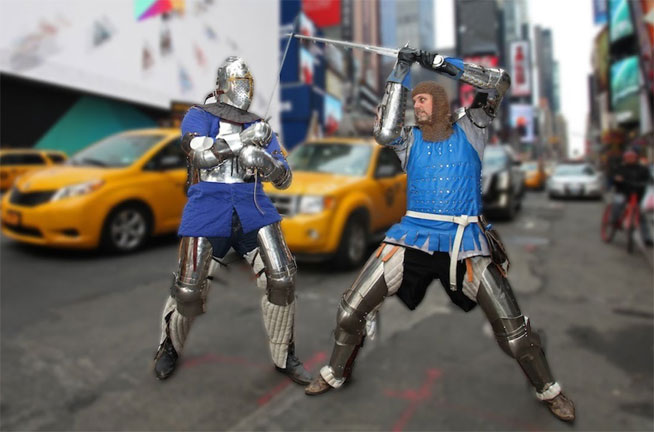
A Journey toward Understanding by Deborah Beach Giordano
Back to Emmaus
Even after hearing the women’s news of the empty tomb (confirmed by {ahem} a male disciple) as well as the angelic message of the Lord’s resurrection, Cleopas and his companion headed for home. They seem to have given up on the whole Jesus business.
Yet perhaps they weren’t quite so sure what to think, for we are told that they engaged in an “intense discussion” about what had happened as they walked along. They were so involved in their debate, in fact, that they didn’t even notice that Jesus himself had joined them.
It must have been a very intense discussion!
(That they argued for nearly the whole of a seven mile journey supports my belief that the two were a married couple. 😉 )
As it was Then…
All that went on with these disciples — the doubt, the debate, the despair; their inability to recognize Jesus — could be a description of our lives today.
 It is not that we are unfaithful to the Lord, we think of Him kindly and lovingly — when we think of Him. It’s only that the troubles of the world are so immediate, so intense; pursuing us like vultures circling, circling, circling… hissing, squinting, hungry, merciless, menacing. Our inherent reaction is to scream and run.
It is not that we are unfaithful to the Lord, we think of Him kindly and lovingly — when we think of Him. It’s only that the troubles of the world are so immediate, so intense; pursuing us like vultures circling, circling, circling… hissing, squinting, hungry, merciless, menacing. Our inherent reaction is to scream and run.
However.
That is pointless. And unhelpful. It solves nothing, and only feeds our fears. We remain in crisis mode, confused and desperate, prone to making poor choices: to reacting, rather than responding.
Caught up in our own anxiety, we forget to breathe. An action as simple and essential to our lives “as the air we breathe” gets discarded along the wayside in our frantic rush to …. to where, exactly?
Stop. Look. Listen. And Live.

Still, we mustn’t be too quick to judge Cleopas and (as I have named her) Sapphira as faithless runaways. There is a great deal of wisdom in the act of stepping back from chaos and confusion: to stop, to think, and to pray. Our two disciples left Jerusalem and went for a walk together; to talk, and think; to reason and discuss; and, ultimately, to decide what to do.
On the road to Emmaus, away from the noise and tumult and powerful emotions evoked by the Passover festival and the events that followed, there was peace and quiet. They had space and time to reflect and remember; to breathe, and to pray.
The two walked along together, sharing thoughts and concerns, intently discussing what they had seen and experienced, what they believed and hoped for, allowing their doubts and their sorrows to flow forth. It was in this intimacy — unfettered, truthful, honest sharing — that the Lord began to be revealed to them. They began to listen to His words with new hearing, and to understand His ministry with renewed, wiser hearts.
Of course He had been there all along.
And when the disciples reached Emmaus, having spent time in reflection and conversation, their hearts warmed with Christian wisdom and compassion, they invited the Lord into their home. There, in “the breaking of the bread” — in a shared meal, in full remembrance of all that Jesus was, all that He said, all that He promised — they at last recognize the Risen Lord.
Faith over Fear
Jesus said, “‘Love the Lord your God with all your heart and with all your soul and with all your mind.’ This is the first and greatest commandment. And the second is like it: ‘Love your neighbor as yourself.’”
~ Matthew 22:37-39, Luke 10:27-28
 Without understanding derived from confident faith in the Lord and compassion for one another, our anxious worrying over what has happened, what might happen, what we fear may happen, can turn into weapons of destruction. When we are frustrated, angry, frightened with nowhere to direct these powerful, terrifying energies, we may strike out at one another; whoever is closest may become a target, words become daggers to cut, to wound, to destroy.
Without understanding derived from confident faith in the Lord and compassion for one another, our anxious worrying over what has happened, what might happen, what we fear may happen, can turn into weapons of destruction. When we are frustrated, angry, frightened with nowhere to direct these powerful, terrifying energies, we may strike out at one another; whoever is closest may become a target, words become daggers to cut, to wound, to destroy.
No one “wins” these battles, the points we score add only to the sum of earthly misery. Vile comments and cutting remarks recoil upon the senders, leaving our own souls wounded and bleeding, the venom blinding us to the Way that can bless and heal. Desperate and unseeing, we continue to struggle and slash, sinking further into the pit of despair, victims of our own malice.
The Light of the World
In the midst of confusion and fear, we must remember to breathe and to pray; to rely on these two life-giving processes — and to rely on the Promise of Christ. Wherever we are in our life’s journey, we are not alone: we are never alone, we have not been abandoned; the Lord Christ has promised to be with us always and forever: “to the end of the age.”
It is our responsibility to live with calm confidence and abiding faith; we have been blessed and confirmed into the lasting joy and eternal life of Christ Jesus: whether we live or die, we are the Lord’s. We literally have nothing to fear but fear itself — which distorts our thinking, damages our relationships, and distracts us from the Way we are to follow.
“What is the cause of their hope?” The question was asked in amazement about the early Christ followers who faced abuse, persecution, imprisonment, and death — and yet remained courageous, hopeful, strong, and compassionate, even to their enemies, because of their faith in the Lord. May we live in that same Way: bravely, kindly, expectantly — looking forward to the Perfect Light, and carrying its warmth and radiance within us, that it may bring life and joy to our world in this time.
Christ’s grace and healing love be with you,
Deborah ✟
Suggested Spiritual Exercise
Take time to breathe and to pray — and remember the Good News of Christ who is with us, always.